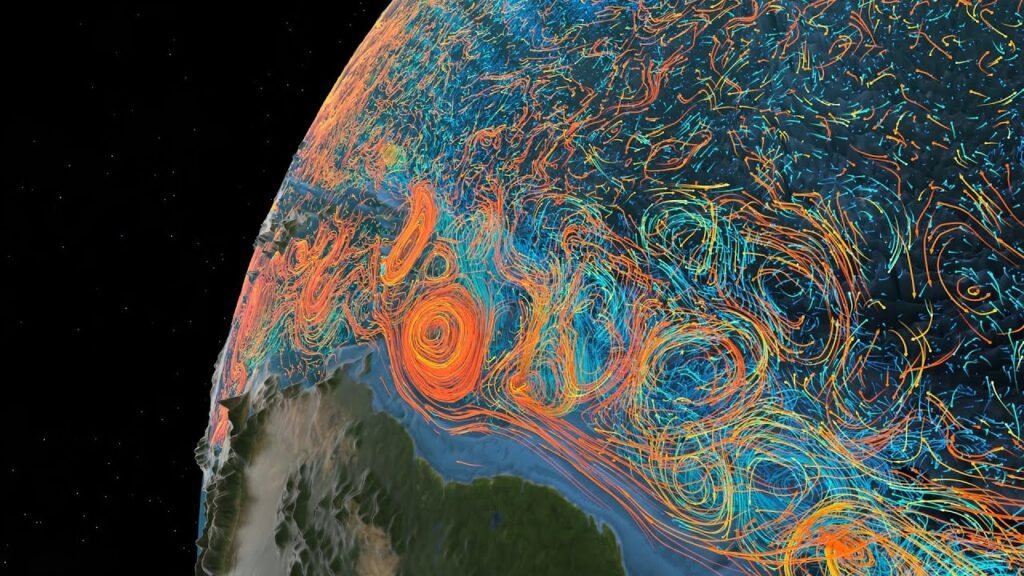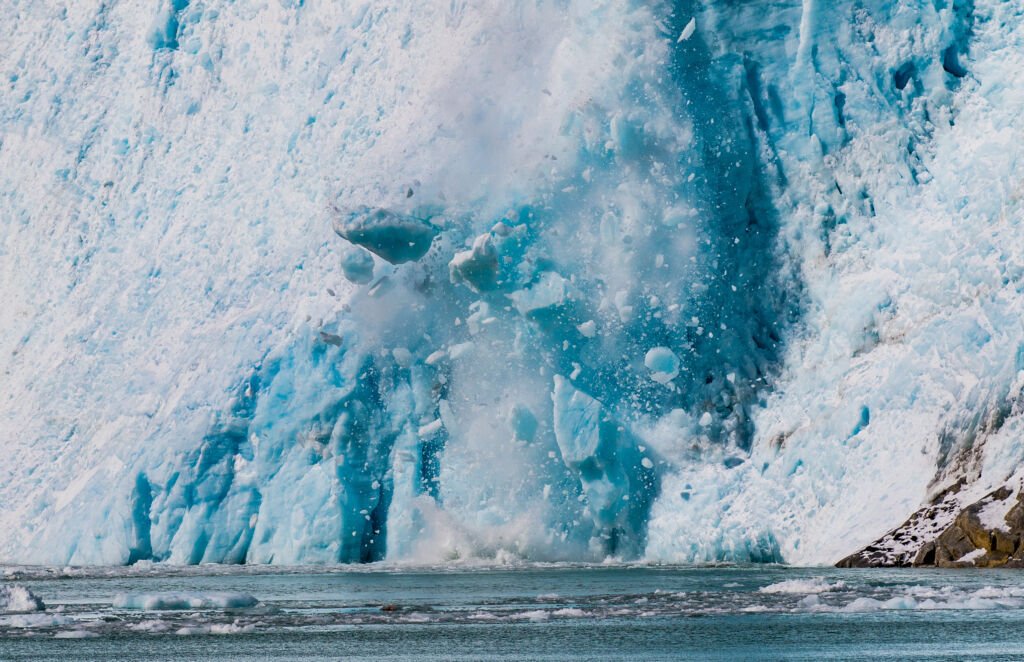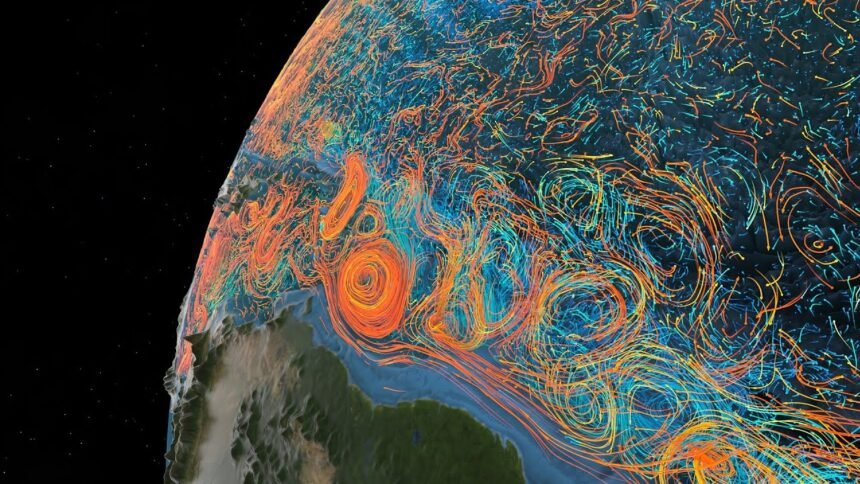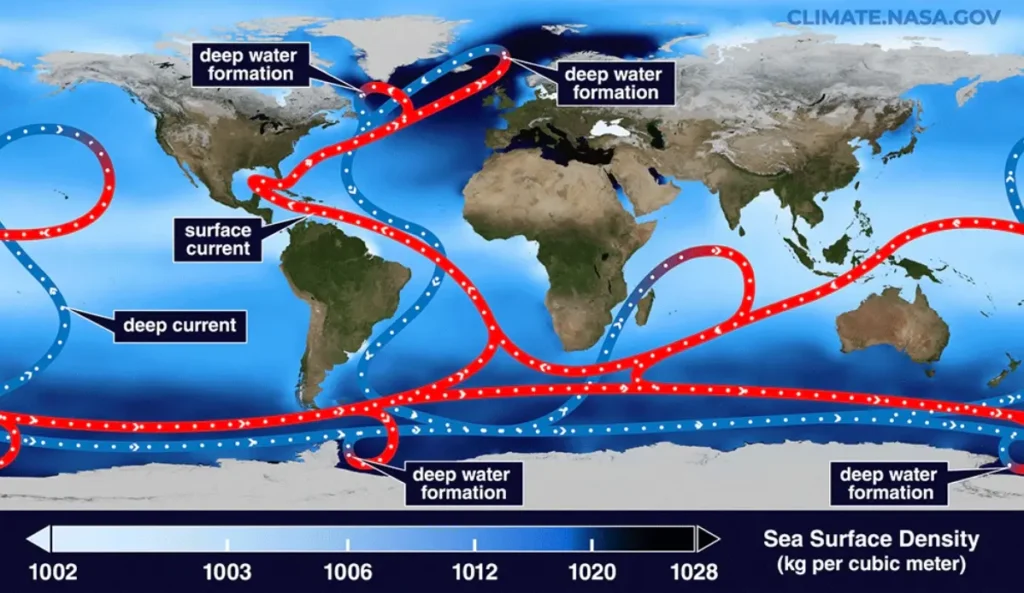Introduction:
An urgent warning echoes through the scientific community: the mighty Gulf Stream could collapse as early as 2025. A new study paints a chilling picture of the potential consequences of a Gulf Stream collapse – a drastic change in ocean circulation that could plunge parts of the world into colder temperatures.
The Gulf Stream, a powerful warm-water current flowing from the Gulf of Mexico towards Europe, serves as a planetary thermostat, keeping temperatures along the North Atlantic mild. Disruptions to this vital conveyor belt of heat could usher in an era of unprecedented climate upheaval.

Recent research delivers a chilling warning: the Atlantic Meridional Overturning Circulation (AMOC), the vast system behind the Gulf Stream, has weakened dramatically over the past century. This isn’t a hypothetical scenario – it’s happening now. Melting glaciers flood the ocean with fresh water, throwing off the delicate density balance that keeps these life-sustaining currents flowing. If the AMOC weakens further, a complete Gulf Stream collapse, while not fully guaranteed, moves from the unthinkable into the realm of the possible.
And by 2025? This chilling prospect is far more than just a theoretical possibility. Studies show that the AMOC is already weakening, and a Gulf Stream collapse would represent a pivotal tipping point in our planet’s delicate climate balance. The question is not if it could happen, but when – and whether we’re prepared.
The Science Behind the Threat - Gulf Stream collapse:
Evidence is mounting that the Gulf Stream – and the broader AMOC system it’s part of – is in peril. Here’s the breakdown of why we should be deeply concerned:
◉ Weakening Circulation:
- Historical Clues: Scientists have used historical data to analyze the AMOC’s past. Records show that the AMOC hasn’t been this weak in at least a thousand years.
- Direct Observations: Modern monitoring methods reveal a worrying slowdown. The AMOC has weakened by approximately 15% since the mid-20th century, a decline scientists warn could signal an approaching tipping point.
◉ Melting Ice Sheets:
The culprit behind the slowdown lies in the Earth’s frozen regions. Greenland and the Arctic are experiencing accelerated ice melt due to global warming. Here’s where the trouble starts:

- Dilution Effect: The colossal amount of freshwater released from melting ice caps flows into the ocean, diluting the salty water essential to the AMOC’s circulation pattern.
- Density Disruption: Freshwater is less dense than saltwater – essentially lighter. This influx of lighter water throws off the delicate density balance that helps drive the Gulf Stream and the AMOC. Think of it like placing a layer of oil on top of water; the two layers struggle to mix.
◉ Tipping Point: The Nightmare Scenario
Climate systems don’t change in a perfectly linear way. Instead, they have ‘tipping points’ – thresholds beyond which small changes can trigger massive, irreversible consequences. Imagine pushing a ball towards the edge of a cliff: once it falls off, there’s no going back.
A Gulf Stream collapse could be one such tipping point. Once the AMOC weakens beyond a critical point, it might struggle to recover, even if we drastically reduce greenhouse gas emissions. This would lock us in a dramatically altered climate system – a world far colder in some regions and likely facing much more extreme weather.
Potential Impacts: A Chilling Forecast
The consequences will ripple globally if the Gulf Stream collapse becomes a reality. Here’s a glimpse into the potential disruptions scientists fear:
◉ Europe's Plunge into Cold
- The Big Chill: Western Europe, accustomed to relatively mild temperatures thanks to the Gulf Stream’s warmth, could see dramatic temperature drops. Some projections suggest declines of up to 10 degrees Celsius (18 degrees Fahrenheit) are possible within decades.
- Devastated Agriculture: Winters would become longer and harsher. Growing seasons would shrink, pushing many crops beyond their viable limits and raising the specter of widespread food shortages.
- Strained Infrastructure: Energy demand would skyrocket as people battle the extreme cold. Existing systems might be unable to handle the burden, leading to potential blackouts and disruptions to transport and other crucial services.
◉ Disrupted Weather Patterns
- Shifting Rains: A weaker Gulf Stream could alter precipitation patterns. Dry spells might become more frequent in some areas, while others face excessive rainfall and flooding.
- Intensified Storms: Ocean temperatures play a significant role in fueling storms. A Gulf Stream collapse could increase the intensity of storms battering Europe and the eastern coast of North America.
◉ Sea Level Rise: The Paradoxical Effect
Ironically, a Gulf Stream shutdown could accelerate sea-level rise along the eastern coast of the United States. Here’s the paradox:
- The Pull of Gravity: The Gulf Stream acts like a river within the ocean. Its powerful flow slightly pulls water away from the US coastline.
- The Rebound Effect: With a Gulf Stream collapse, that ‘pull’ disappears. Water that was ‘held back’ could surge towards the eastern US, exacerbating the local effects of sea-level rise caused by the melting ice caps. Coastal cities would face inundation and increased erosion.
These impacts paint a sobering picture, underscoring the far-reaching consequences of a potential Gulf Stream collapse and the urgent need for action.
Is a "Mini Ice Age" Accurate?
The phrase ‘mini ice age’ is attention-grabbing, but does it accurately portray the potential consequences of a Gulf Stream collapse? Let’s unpack the science behind this dramatic term:
◉ Clarifying Terminology:
- Think Locally, Not Globally: An actual ice age, like the one the Earth experienced thousands of years ago, brings massive ice sheets and plunging temperatures planet-wide. While a Gulf Stream collapse would cause severe regional cooling, a global ice age is doubtful.
- The Power of Words: ‘Mini ice age’ conjures up an alarming image, helpful for drawing attention to the severity of the potential impacts, even if technically somewhat inaccurate.
◉ Regional Disparity:
- Not Everyone Gets the Chill: The effects of a Gulf Stream collapse would be uneven. The North Atlantic region around Europe and Eastern North America would feel the most dramatic temperature plunge. But, as this warm water gets redistributed, other parts of the planet could experience increased warming.
- Complex Climate Systems: Climate patterns are interconnected. Changing one element, like the Gulf Stream, creates ripple effects. The overall picture isn’t just about colder temperatures everywhere but a significant shift in global climate balances.
◉ Uncertainty and Debate:
The science on this issue is still evolving, and projections carry uncertainty. Here’s where the debate lies:
- A Range of Possibilities: While the AMOC is confirmed to be weakening, the timing of a potential Gulf Stream collapse and its precise severity remain subjects of research. The collapse could be more gradual, happen later, or that other factors come into play.
- Science Is Needed: Within the scientific community, there’s active debate about the thresholds for tipping points or whether other climate trends could partially offset a Gulf Stream collapse.
The Big Takeaway: A Gulf Stream collapse carries enormous risks, whether called a ‘mini ice age’ or a dramatic climate shift. The scientific community’s strong consensus is that the risks are too high to ignore. Research and discussion continue to refine our understanding and preparedness for potential disruption to this critical ocean system.
Call to Action: It's Not Too Late
The potential Gulf Stream collapse and its projected impacts should not paralyze us with fear but instead ignite a fierce determination to act. While the warnings are bleak, there’s still a window of opportunity to change course. Here’s where we need to focus:
◉ The Climate Imperative
- Cause and Effect: This study serves as a chilling reminder of the intertwined nature of our planet’s systems. Greenhouse gas emissions from human activities cause destabilizing forces like the potential Gulf Stream collapse. Drastic and immediate reductions in emissions are not merely desirable but essential for survival.
- Time is of the Essence: Even if we act decisively, some degree of change is inevitable. However, delayed action drastically increases the risk of hitting catastrophic tipping points and locking in irreversible alterations to our planet.
◉ Global Cooperation
- No Nation is an Island: Climate change knows no borders. The collapse of the Gulf Stream would have worldwide consequences. Isolated efforts cannot prevent this kind of global disruption.
- United Front: Major emitters must lead the way with ambitious carbon reduction targets while assisting developing nations in transitioning to cleaner economies. Collaborative solutions are our only hope.
◉ Beyond Doom and Gloom
- The Solutions Mindset: While the situation is severe, we must move past helplessness. Discussions need to become action-oriented and solution-focused.
- Innovation and Resilience: Prioritize investments in renewable energy technologies and make infrastructure more adaptable to withstand future climate scenarios.
- Hope & Tenacity: Let this warning ignite a fight for a better future, driving policy changes and the innovation needed to adapt and survive.
The message is clear: a potential Gulf Stream collapse is a grave threat, but one we can still steer away from – with urgent, concerted global action.
Conclusion: Choice Determines Our Future
Let’s summarize the critical takeaways from this alarming study:
- The Warning: Research suggests a Gulf Stream collapse is worryingly plausible, perhaps even as soon as 2025. The ripple effects would be global, disrupting temperatures, weather patterns, sea levels, and ultimately, the livelihoods of millions.
- Uncertainty and Risk: It’s vital to acknowledge that some uncertainty remains as to whether this catastrophic scenario will fully play out. But, given the stakes, uncertainty cannot excuse complacency.
A Precautionary Tale: The potential weakening of the AMOC and an imminent Gulf Stream collapse must not drive us to despair but to fierce and coordinated action.
The science lays out a clear choice:
- Ignore the Alarm: Suffer the worsening impacts of climate change and risk triggering irreversible shifts that will leave immense human suffering in their wake.
- Heed the Call: Choose transformation. Fight for systemic changes towards sustainability. Invest in a global transition toward a world powered by clean, renewable energy.
Our ability to avert the potentially catastrophic Gulf Stream collapse hinges on embracing bold and decisive action today. Let this serve as a powerful wake-up call.



